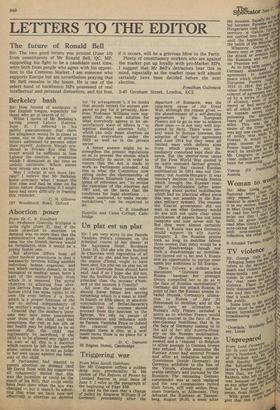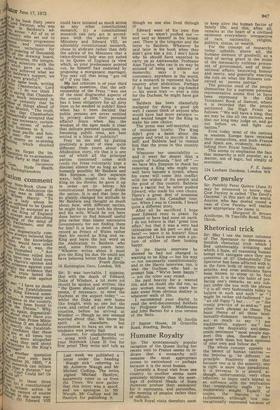Triggering war
From Miss Sarah Gainharn Sir: Mr Cosgrave suffers a sudden drop into provinciality in his review of The Reform of Power by Leonard Beaton in your issue of June 3. I refer to the paragraph at the beginning of Page 859.
It may be the case that a change of policy by Emperor William II of Germany, presumably after the departure of Bismarck, was the long-term cause of the Great War, although the reason given — the abandonment of a self-denying agreement by the European Powers not to go to war to achieve their aims — is not very well supported by facts. There were several wars in Europe between the adoption of that tacit agreement and June 1914 but they were all limited wars with definite aims from which powers not immediately concerned kept their distance. But the shorter-term cause of the First World War quoted is on quite unsound factual ground. The Power that caused Russian mobilisation in 1914 was not Germany, but Austria-Hungary. It was Vienna's decision to invade Serbia which brought the Russian reaction of mobilisation (after some havering about partial mobilisation which had no practical effect since this was not possible in the Russian military system). The reasons the Czarist government did not wait to see what Germany would do are still not quite clear since publication of papers has not been complete and now never will be. But they were almost certainly three: 1, Russia was sure Germany would support its ally AutriaHungary; 2, the Russian armies took so long to mobilise (about three weeks) that delay would be a major disadvantage though not such a disadvantage as mobilisation turned out to be; and 3, Russia saw an opportunity to pursue once again her ambitions in SE Europe.
There follows a definite misstatement. "Germany attacked Russia because her strategic theory compelled her to do so in the face of Russian mobilisation'." Germany did not attack Russia; in point of fact the Russian armies invaded Prussia. Germany's ultimation to Russia of July 31 threatened to mobilise, and at the same time an ultimatum to Russia's Ally France included a query as to whether France would remain neutral in the face of Russian-German hostilities; that is, in the face of Germany coming to to the aid of her ally Austria-Hungary on the Russian mobilisation. Neither of these ultimata was answered and a 'request' to Belgium to allow passage to German troops was refused. In the meantime the Russian Army had entered Prussia and after an indecisive battle at Gumbinnen (inside Germany) the Germans withdrew to the line of the Vistula, abandoning considerable territory and pursued by the Russians. The retreating German commander was at once replaced and the new commanders rallied their forces, still well within Prussioan frontiers, at Allenstein. They defeated the Russians at Tannenberg, August 26-30, a week after 11c his book Sixty years k Lord Swinton, who was ister in Baldwin's ad,011, writes: " AP of us at ministry who set out to revolutionary programme ak Pension and innovation defence techniques for ' e ordering of thousands off the drawing board, sw Factories, the integrefeiading scientists with the Which gave us radar, have achieved what we g ut Baldwin's support; we aeil ad were grateful.' mill the same book, writing all geville Chamberlain, Lord s,17s: "I do not think I saYing that Chambernot much interested in or certainly that he er of things ahead of after Munich, "The truth, 5 ;Was that Chamberlain e s'eheartedly accepted that af \vas necessary, certain10 the extent of subor „e_ business to it. . •n • , 7 Most pacific and ho
Se ”' Men: the vast ex
x it
bt iPe ee•
x money on re-arming 'Lning which shocked 41,1•Isf we forget the im? SS 1,Position to re-armament 'uoUr Party at that time.
114 ICLhs . . Heath,
see Deramore
ailoe, Hyde . • nuckinghamshire lea '











































 Previous page
Previous page